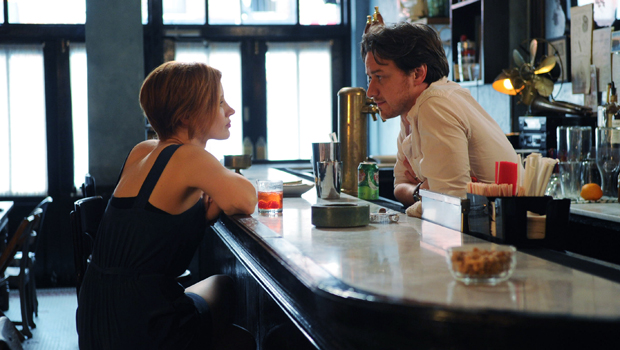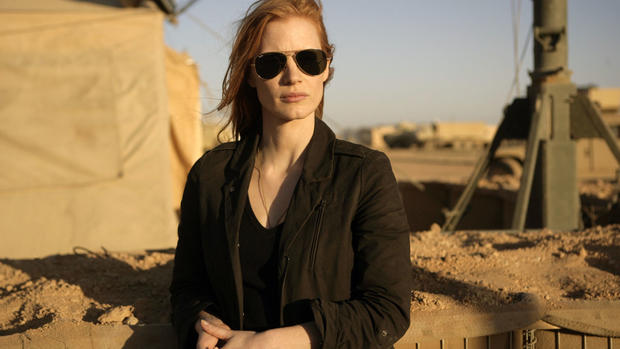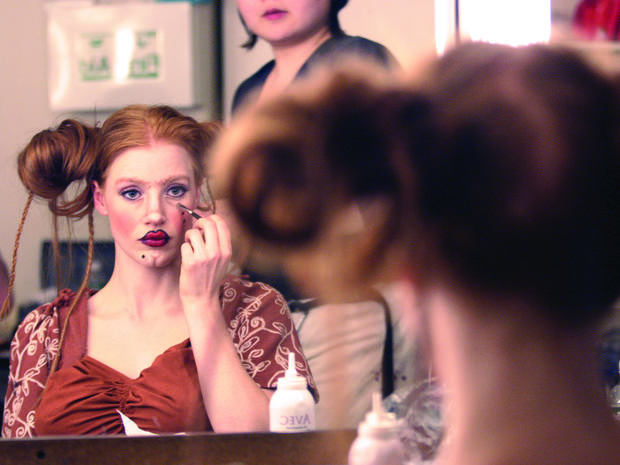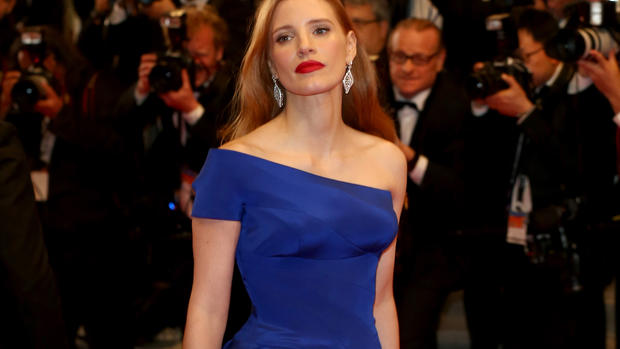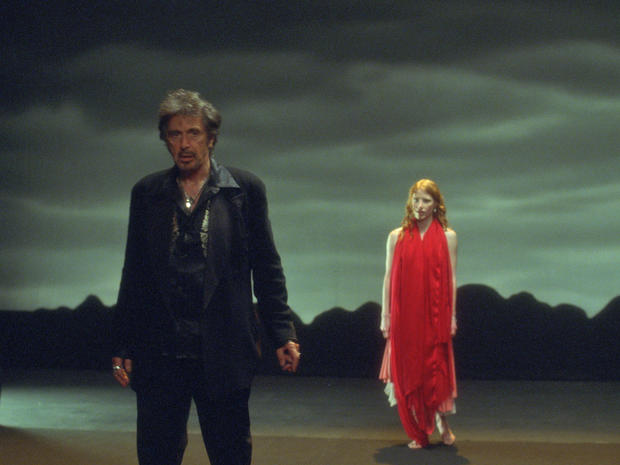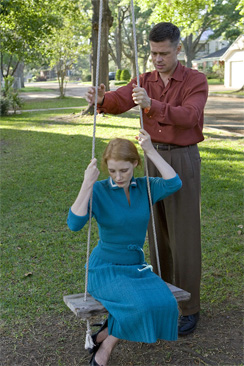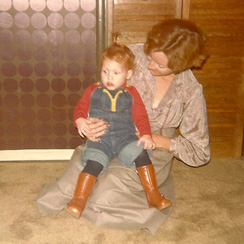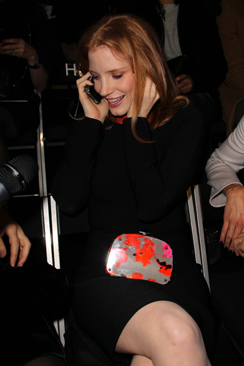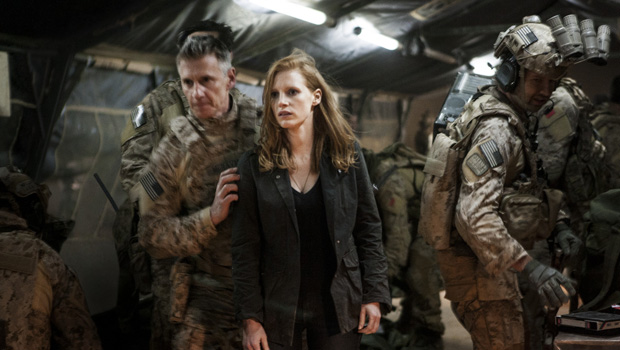Extended interview: Jessica Chastain
A graduate of Juilliard in New York City, Jessica Chastain has become one of the most respected and sought-after actresses today, with stunning performances in such films as Terrence Malick's "The Tree of Life," Al Pacino's "Salome," "The Help," "Coriolanus," "Take Shelter," "The Debt," and "Zero Dark Thirty."
Two new features starring Chastain make their debuts this fall: "The Disappearance of Eleanor Rigby: Them" (a re-edited version of two films made in parallel about a young couple's struggle to stay together); and the period romance, "Miss Julie," an adaptation of the August Strindberg play directed by Liv Ullman.
In this web-exclusive extended transcript, Chastain talks to correspondent Tracy Smith about her "overnight" success following years of working in films whose release schedules kept getting delayed; about the important role Robin Williams played in her life; her Oscar nominations; and the intensity that she brings to her work.
- The brightly-burning star that is Jessica Chastain ("Sunday Morning," 09/14/14)
Smith: So let's talk "The Disappearance of Eleanor Rigby." First, there were two movies, and then they were combined?
Chastain: Yes. You know, there's "The Disappearance of Eleanor Rigby: Him" and "The Disappearance of Eleanor Rigby: Her." It's a movie about a couple who are in love, who should by all accounts be together. They're perfect together, but when faced with a tragedy and realizing that they grieve in separate ways, it begs the question: Can you love someone enough to let them go, and hope that they could come back, but know that they may not?
And that story is told from the male point of view in "Him," and the female point of view in "Her." "Them" is a combined version of the two.
Smith: There's a tragedy that happens in this movie. There's a lot of pain in this film?
Chastain: Uh-huh.
Smith: Are you able to walk away from that on a daily basis when you were shooting it? Could you go home at night and let it go?
Chastain: (sighs) To be honest, it depends on the film set and the characters I'm working on. With this one it was easier, because James McAvoy is a bit of a goof ball (laughs), and no matter what scenes we'd be working on he was always finding the fun, which is a good lesson for me and something actually I've been told my whole training and everything, is that I need to play more.
Because I'm a very serious worker, and my passion is my work, and sometimes when I approach a character it's like this giving over everything to it. But it doesn't have to take over me! And sometimes when you crack jokes and have a good time on set, even when subject matter is dark, it creates a freedom that perhaps you wouldn't have had without that.
Smith: So you're learning that?
Chastain: Yeah, James McAvoy, my professor on this film!
Smith: Give me an example of a character that took over you?
Chastain: Gosh. It happens a lot. Not in, like, crazy "method" way where I believe that I am the character (laughs), but you know, I just did a movie with Guillermo del Toro. He's one of my favorite people in the world. And the character was incredibly dark, and we worked on it for four months in Toronto.
So I wasn't surrounded by my friends and my family, and it just felt very lonely, and life became kind of sad and dark (laughs). So sometimes -- I know this sounds kooky and crazy but -- you've got to find a way to say goodbye to a character.
I like to wear wigs because to me that is a form of an exorcism (laughs), in a way -- like taking off the character. I like sometimes when I'm acting to not look like myself, because then when I look in the mirror as Jessica, I know who I see.
Smith: You can find that separation.
Chastain: Absolutely. And I like extravagant costumes and hair pieces and prosthetics on [my] face, because there is this feeling of, yes, I'm coming from a seed of truth creating another person, but I get to say goodbye to that person at the end of the day.
Smith: It's good that you realize this about yourself? That you need some sort of transition to say goodbye.
Chastain: I think it's a normal thing. I mean, someone told me recently about a kind of therapy, it's laughing therapy where if you're not feeling happy, you force yourself to laugh. I feel like, okay, I've got to laugh for five minutes today. And it will actually change your brain.
Smith: You've tried this?
Smith: You mentioned Juilliard. Do you remember when you first heard about Juilliard?
Chastain: When I was in high school, there was a trip to visit New York, and I went on that trip. I think I was like a sophomore or something, and I actually had an old picture -- it's lost now, because it was before digital (laughs) that saves everything -- of me walking in front of the school. And that's when it started -- hearing it was the best training school in the United States and possibly the world.
And then when I was working at a professional company -- I was doing "Romeo and Juliet at" Theater Works, and the actor I was working with who was playing Romeo got into Juilliard. And I remember when I found out he got into Juilliard thinking, it felt like this faraway place that you had to be this insanely amazing person. And of course the guy playing Romeo was amazing, but I thought, well, we're acting opposite each other, so maybe I could audition. And who knows? And that's actually what got me interested in auditioning, thinking that maybe it was a possibility.
Smith: Were you worried about how you'd pay for it?
Chastain: Yes, but I never thought about that. I don't know why. I never thought of money when I was young probably because money -- not that I had money. We definitely didn't have money. But there's something freeing in not growing up with money. I remember one time asking my mom -- I wanted to go to a concert, probably New Kids on the Block, I think it was (laughs) -- and I said, "Can I have $20? I'll, you know, clean the house or whatever." And she's just like, "I don't have it." So there were money talks at the time, but I always just thought, well, I'll take loans or I'll do whatever I have to do.
And I had no idea what schools can cost or how much living in New York City can cost. It was just this kind of blind faith. I just felt I needed to audition for the school.
And then it was this incredible phone call. Kathy Hood called me to tell me that I was accepted into the program before I got the letter. I was super excited. And after that moment of joy, then there was the feeling of, like, oh gosh. What does this mean? How much is this school?
I could see on my parents' faces they were so proud of me, but then immediately the eyes. Like, the panic where they're smiling, and it's like, How am I gonna do this? (laughs) You know, she has to go, so we're gonna find a way to make it work.
Smith: How did you make it work?
Chastain: Well, Juilliard is very, very, very, very generous with their scholarship and loan program, and I was very lucky end of my sophomore year. I benefited from a scholarship from Robin Williams. He gave a scholarship to a student every two years. And it made it possible for me to graduate college. I'm the first one in my family to graduate college.
Smith: How big of a deal is that?
Chastain: It's huge. I remember there was this summer before my senior year. I was in L.A., and a couple people had suggested, 'Well, what would you like if you got a holding deal or auditions? That would mean I would have to leave before I could finish my fourth year. And I decided not to pursue anything like that because I wanted to graduate, but also I felt it was a great responsibility. I knew [with] the training that I was getting [was] something that I would always regret if I left and didn't have that bachelors of fine arts in my hand (laughs). But I felt a great responsibility to my classmates.
I didn't want to abandon them. I felt a responsibility to my family. My grandmother was sending me money every month. Everyone who was working really hard to see me through college. I felt a responsibility to Robin Williams who was a complete stranger (laughs). Anyone who was supporting me, I thought, I can't leave. I going to see this through. And it was worth it.
Smith: Did you get a chance to meet Robin Williams and thank him?
Smith: So now you think you're gonna do some of the same stealth work?
Chastain: Absolutely. I mean, I haven't talked, but I'd love to see whatever we could do to keep the scholarship going and make sure that that spirit continues to live.
I think that actors, for me, are some of the most generous people I've ever met, because you could meet a stranger, and then immediately they're opening their heart and are sharing these intimacies with you and protecting you, and you have each other's back. And to me actors are my family, in addition, of course, to my family. And so I love the idea of seeing if there's a way, [given] how he changed my life, maybe someday I could help change someone else's life.
Smith: Find that kid who maybe isn't sure how to pay for Juilliard, and say, 'Here, don't worry about it'?"
Chastain: Yeah. I mean, sadly, I don't make -- as financially successful (laughs), but it is important to me to see whatever we can do to keep it going.
Smith: Maybe that's incentive to take that action movie that you wouldn't normally take! I could pay for somebody to go to Juilliard.
Chastain: There you go!
Smith: After you got out of school, how easy or hard was it to get work?
Chastain: It was hard for me because I didn't start to get work until I started to think that I might be okay of an actor (laughs). It's this weird thing that happens in your brain. If you feel like a failure, you're going to walk into a room and just project that to people that you want to cast you.
Smith: So you felt like a failure?
Chastain: Yeah. I had such an incredible experience here, working with the most gifted people. Right when I got out of school, I was very lucky, I got a holding deal with John Wells [the producer of such series as "E.R."], which was incredible, and that was in my first year of graduation, and I did some TV work.
And so I had a great first year. But then after that, I would go into meetings. I couldn't get auditions for films or anything. I was getting typecast as, like, victims, guest star victims on TV shows. Or, like, really the weird ones (laughs), the ones that are kind of neurotic or crazy.
And also, it was kind of sad to me that a lot of people that I was meeting hadn't heard about Juilliard, or even thought necessarily about a training program or--
Smith: "Juilliard, what's that?" Really?
Chastain: Yeah, I actually had some meetings with casting directors who didn't know the school. And you think, after you spend so much time working so hard, working on Shakespeare and Chekhov and the classics, which I think are the hardest things to hone in -- and the most beneficial things to hone your skills -- to then go auditioning for little tiny things on TV shows [and] no one believes in you, when you first walk in.
It's kind of sad, and I remember looking at a lot of people in L.A., when we'd all be sitting there waiting to go in, and we all kind of looked defeated before we would go in to audition. And there's something kind of sad about that.
But I had my group of friends. Jess Weixler, who was my roommate here at Juilliard. Ned Benson, who's the writer and director of "The Disappearance of Eleanor Rigby," Cassandra Kulukundis, other classmates from school. And whenever we would have an audition, we would kind of get together -- we still do, actually -- and work on the sides and help each other and support each other and root each one on.
There's this feeling of, like I said, a family. It was a support system. That's why I say I love these people. And even today, whenever I meet someone who comes up to me and tells me they're an actor, I love them (laughs)! I love these people that made this choice to choose this incredibly difficult profession and are going at it with all this love and passion and hope. I find it so inspirational, and I just want to tell every single one of them that I believe in them and that they're beautiful and special (laughs).
Smith: Something that maybe you needed to hear early on.
Chastain: Yeah, that I heard from my friends, from my support group.
Smith: In 2006 you auditioned for "Salome," in front of Al Pacino, and he's described that as, "I was looking at Marlon Brando. She was a prodigy."
Chastain: Oh my God (laughs)! Insane to hear this. If I could only go back and tell that girl that, because I was thinking, "I'm a failure!" (laughs)
Smith: Standing in that audition, really?
Chastain: Not in that audition. Something clicked for me in that audition. But also I had material. I wasn't reading some sides for, like, some secretary. I was reading a flesh-and-blood female character, with an incredible arch and backstory. And it wasn't just about how I looked or what I sounded like or for my two lines in a scene. I got to go to this audition and have text. And it was like breathing air again (laughs)! I remember that audition and going in, I was so nervous. And before I went in, I started to get the shakes -- I would get the shakes sometimes before an audition.
And I told myself -- it really happened -- I said, "Listen, behind that door is Al Pacino (laughs). And you know what he sounds like, and you know what he looks like. It would make sense to be nervous if you were meeting a stranger. But actually you should feel comfortable, because there's nothing [that's] going to surprise you."
And I went in, and I met [producer] Robert Fox, Al Pacino, Estelle Parsons, read with Jeremy Strong, and he said, "Why don't you start at the beginning of the play for her." I started at her entrance, and he just let me go and go and go and go. And I could hear from the audience -- but not see 'em, you know, 'cause I was with my scene partner -- like, "Oh, wow." (laughs) And like, "That's amazing." (laughs) All these things, gasping from the audience. And every time I heard [that] I was like, "I'm doing a good job." (laughs) Then I just became more confident, more like, (gasps) "Someone believes in me!"
Smith: Not just someone --
Chastain: I know, right? I mean, come on! Talk about, like, such a great mentor. And he has been such an incredible teacher. He taught me so much about acting for camera and all of that stuff,
Smith: And it's interesting because after that, after "Salome," you started to do quite a few films?
Chastain: "Salome" was my first film.
Smith: And then there was a string of them, but they got hung up?
Chastain: Yeah. It's funny because I was working. Even when I wasn't working in L.A. and just auditioning, I still was going to the library, adapting "Hamlet" for a female movie (laughs).
Smith: This is what you did in your spare time?
Chastain: Yes, no matter what, I made sure I was working every day. But, yeah, I was doing Terrance Malick's "Tree of Life" and I got "The Debt" and all these incredible films, but for one reason or another, they would get hung up. "Salome" is just now is coming out in the U.K. September 21st, and it was my first film. "The Debt" was being released by Miramax, and it was announced right before it was coming out [that] Disney sold Miramax, so they stopped the release. Everything stopped, so I thought, 'Okay, what is going on? I don't understand. I've wanted to do this my whole life, I'm getting to do it, but why is it not coming out into the public?"
And then 2011 happened, and it was like --
Smith: Bang! I mean, how many films came out in 2011 that you were in?
Chastain: I don't remember. "Coriolanus," "Take Shelter," "Tree of Life," "Salome" went to Venice. "The Help." I feel like there's another one that I'm forgetting (laughs). "Texas Killing Fields"!
Smith: Were you telling people, "I swear, I'm in the movies"?
Chastain: Yes, oh my gosh! So my first film, I'm acting opposite Al Pacino in "Salome." I mean, come on, my first on-camera scene partner is Al Pacino! And of course my parents are telling everyone and my grandmother.
And she came to see the play, she got a picture with Al, which she then put in a frame and put on her bedside table, her and Al (laughs). And so everyone's telling, "Yeah, oh, yes, Jessica, she's doing great. She's acting with Al Pacino." [And] The movie's not coming out.
Then I get "Tree of Life" opposite Brad Pitt. I mean, is there a bigger movie star? (laughs) And everyone's telling, "Yeah, Jessica's playing Brad Pitt's wife. They're married in this film, and it's with Terrence Malick." Years are going by. Nothing's coming out. So at one point my mom called me up laughing. She goes, "Everyone thinks we're lying!" It's like, 'What are you doing in L.A.? Because none of your movies are coming out." But then I had the last laugh (laughs).
Smith: What was that year like for you?
Chastain: It was really shocking and special because all of a sudden everything was coming out. I used to feel like, I would go on a film set and the actors would kind of look at me and go, "Okay, we've never seen her before. Is she any good?" (laughs) Like, I could feel this kind of, "Okay, let me prove myself."
And there was something kind of amazing about having these movies come out with people that I love. Like, I love "The Help." I love those ladies from "The Help" so much. I loved going to Cannes with "Take Shelter" and "Tree of Life."
Not only was it just my movies coming out that I was so proud of, but I got to go to film festivals. I love watching movies. I'd always dreamed of going to a film festival and meeting directors. I think it was 2011, I was at the Palm Springs Film Festival, and earlier that day I had seen Gary Oldman in the restaurant, which I freaked out. I was like, "It's Gary Oldman!" but I was too embarrassed to go say hi.
And on the red carpet someone says, "Who are you excited to see tonight?" I go, "Well, Gary Oldman. I saw Gary Oldman is here, I know for sure, because I saw him in the restaurant. So I would be really nice to meet him." As I'm saying that, he comes around down the carpet and comes up to me and goes, "Hello, Jessica, I just wanted to say I love your work." I mean, the stuff he was saying was what I imagined I was going to say to him when I met him. It was like being in "The Twilight Zone," you know, where I'd spend so much of my life as a film fan, this kind of nerdy girl that goes to the theater and watches double features of Hitchcock. And I love Gary Oldman in "Dracula." "Dracula," for me in particular was pretty special. And he said all this to me, and he goes, "I was too shy to come up to you." And I was like, "You were too shy, I was too shy!" And then he walked away, and I started crying. And of course it's on camera, which is kind of embarrassing, but I guess it was just me coming to terms with, like, it's so wonderful that I can't imagine that all this is real.
Smith: You had dreamed about this since you were how old?
Chastain: Since as long as I can remember. Since I knew it was something that a person did for a living. It wasn't like I want to be an actor; I was like, that's what I am. My grandmother took me to a play when I was seven years old. "Joseph and Amazing Technicolor Dreamcoat," I think it was. And it was just interesting 'cause we never really went to go see the theater in my family or anything like that. She said, "Well, this is kind of a special occasion because this is a real theater. You know, these were expensive tickets or whatever (laughs), and as a professional play, they do this for their job."
And then I remember there was a little girl on stage, and as soon as I saw that a little girl was doing it as her job, it's just like clicked in my head, like, "This is my job." I wasn't a great student. I wasn't so good at sitting in a desk and doing the math stuff. I had a great imagination, but I didn't know how to make it work in a public school system (laughs). But for some reason when I saw this girl onstage, immediately I knew this is what I'm supposed to do.
Smith: It wasn't even, 'I want to do this"?
Chastain: No. This is what I am. And that's the moment I'm so profoundly grateful for because I've seen so many people, like some of my siblings struggle with, "What do I want to study?" Or "What do I want to do with my life?" I've never once had that question. I've always known. And it doesn't necessarily mean I'm going to be hugely successful. It's not like I said, I have to get nominated for awards. I never had those kinds of expectations or demands of myself.
It was just like there's something in me that wants to use my imagination and my creativity, and there's this closeness you feel with other actors when you're onstage, and this incredible connection.
Smith: You've thanked your grandma?
Chastain: Yes (laughs).
Smith: Over and over, for introducing you to acting?
Chastain: Uh-huh.
Smith: She got to go to the Oscars with you?
Chastain: Yeah, both times.
Smith: What was her take on all of that?
Chastain: The first one was super special. She told me that night was the best day of her life. It was really special.
Smith: That's wonderful. To be able to give that to her.
Chastain: Yeah. Well, everything she gives to me.
Smith: How did you hear when you were nominated the first time for the Oscar?
Chastain: I was traveling. I got invited to go to Paris for a fashion show by Armani, which, I mean, that's super cool. They're like, we're gonna fly you to Paris with your best friend, and you get to go to some fancy fashion show and stay in a beautiful hotel. It was pretty special. So I was there, and it wasn't until I was there that I realized Oscar nominations were going to come out. Because a lot of people at Armani were like, "Good luck today. We're rootin' for you!" And that's when I realized, oh my God, the Oscar announcement is today, and everyone's expecting that I'm -- and it's not gonna happen. And I'm going to get humiliated in front of everyone.
Smith: But that was your gut: "It's not gonna happen, and I'm gonna be humiliated"?
Chastain: Yeah, completely (laughs). I [preferred] to just pretend it's not happening. I go to the fashion show, and before it starts, I go to turn my phone off, and I saw I had 15 missed calls. And I saw that, and then immediately I could start to feel my heart beat fast, like, oh my God (laughs). And then I saw some text that was, "Congratulations." But I didn't want to turn to my friend and be like, "Oh my gosh, I got-- " you know, because it didn't say "Congratulations on your Oscar nomination" (laughs)
So I opened the phone, and I had a voicemail from my agent, and I started to play it. And she was like, "Congratulations, you got an Oscar nomination this morning." And as I was listening to the voicemail -- I guess they were all getting the information around the same time I was -- people started taking pictures of me (laughs). There are these pictures where I'm like listening, and I'm going -- because, like, the emotion is so big and so sweet. My movies had just come out, and here I am now getting this nomination. And all of a sudden there are 30 cameras on me going, "How do you feel?"
So it was a really big way to get the news. But I'm actually super happy about it, because even though [they are] not the most flattering pictures, it's just pure joy on my face. It makes me feel really happy.
Smith: And then to have that not just once, but then it happens again?
Chastain: (sighs) I mean, come on. That's completely shocking. And it was like, all of that first year, I was going, "I'm gonna enjoy this 'cause this is probably never gonna happen again." I was saying in all the press (laughs), and then all of the sudden the next year, I was like, "Why am I seeing you guys again?" (laughs) This was 2011 that my movies first came out. It's only 2014 right now. So I'm still navigating my way through this life.
Smith: Meaning?
Chastain: Meaning I'm still not used to it. It's still surprising to me if a director or an actor that I really respect knows my work.
I can be a bit of an awkward girl. I'm not like super-confident and feel like, oh, I own my place. I feel a little bit like, okay, whatever, all the hard work I've done in the past five years, I do now have a place in this business. But I do feel a little bit, well, who knows how long this is gonna last? (laughs)
But I wonder if that will always be the case with me. Let's just enjoy it while it lasts because it could be gone tomorrow. I think that's probably a good way to live.
Smith: You can't still feel like a failure, though?
Chastain: No, I don't feel like a failure.
Smith: That's gone?
Chastain: Yeah. I'm very self-critical sometimes about my work. I'm pretty -- like, I can watch my films. I don't freak out about that.
Smith: You do watch your films?
Chastain: Yeah, I have no problem. I can watch it from a very technical point of view.
Smith: Do you pick, pick, pick?
Chastain: No, not at all.
Smith: No?
Chastain: I don't know what it is. This movie I did with Guillermo del Toro ["Crimson Peak"], we had to reshoot something for a lighting issue. And we kept shooting it, and I could tell he wasn't happy, or we weren't moving on because he wanted something [else].
So finally I said, "Okay, show me the take that you liked (but we had a lighting problem), so I know what I did." And I completely watched it. Doesn't make me self-conscious, doesn't freak me out. And then I tried to figure out how do I create it new again?
But when I'm watching myself on film, I don't feel like I'm judging myself because I do kind of fall into the story. And I kind of fall into the character being something kind of different than myself.
But I'm super critical. Like, of why am I so awkward sometimes (laughs). Like, why when I meet people do I stutter? Or, you know, I'm doing press right now with Matthew McConaughey and Anne Hathaway [for "Interstellar"], and the three of us sitting next to each other, and I'm like, "God, the two of them are so incredible. They're super easy, and and I just felt like -- "(laughs)
Smith: And you're not?
Chastain: Well, I feel more nervous or kind of like -- not "Why am I here?' but it's a different feeling. And I kind of wish, like, I had that swagger McConaughey has. I mean, I think probably we all do, but man, that man's got a swagger! Probably not in this lifetime for me (laughs).
Smith: You're not gonna get the swagger?
Chastain: No. That's all right. (laughs)
Smith: At the same time, I just ask about Maya [her role in "Zero Dark Thirty"], because there's an intensity there that seems like perhaps it is a part of you. Are you that intense, sometimes at least?
Chastain: I can be. One thing I connected to with the role is this obsession, that she kind of like goes into this work mode, and she doesn't hear other things. I can definitely have that happen to me. Like, if I'm trying to figure something out or on a set and doing a scene, sometimes I can get really involved.
And I'm intensely involved. But that was probably the hardest part I've ever played, because there [are] many more differences between Maya and myself than similarities.
She is someone who doesn't care at all what other people think. (laughs) That's not me! Also, the one thing I could connect with her [on], which was the bridge, was the obsession with work. Most of the other things I really kind of struggled with in finding the character.
Smith: I just want to go back to what you said about thinking that maybe this ride will come to an end. Are you able to enjoy it?
Chastain: Yeah.
Smith: Or are you thinking this is all going to go away?
Chastain: No, there's something actually kind of freeing [about] the whole "Who knows how long this is gonna last, so we might as well enjoy it." It is such a lesson in living for this moment. And as an actor that's what you have to do. You have to be able to really be in the moment and be present and not have expectations. So, yes, that's while you're acting. But in personal life, you know what? I'm so lucky right now, and I'm so excited, but if I think in my head that in ten years they're going to fly me to Paris for fashion shows and put me up at the Crillon, and I expect that's going to be my life, I'm probably going to be really disappointed.
You know, it's better to just go, "Listen, this is where I am right now, and it's pretty great. Who knows if any of us will be here tomorrow, so as long as we are here, let's really put as much as we can into the moment." That's what I try to do when I act, and that's also what I try to do personally. I mean, if I wasn't an actor, I would be so incredibly shy that I would probably be in my house a lot. (laughs)
Smith: Seriously?
Chastain: Yeah. I'm not -- there's something so amazing about this profession that allows that for all of us. It's like we get to play make-believe. We get to put on funny wigs and funny costumes and talk in funny voices and get paid for it. I mean, it's a bit ridiculous and amazing, so I don't know if I'll ever get out of the moment of, like, "Okay, this may go away." (laughs) So I'm really going to be fully involved and obsessed and intense with every moment that I can.
To watch the trailer of "The Disappearance of Eleanor Rigby," click on the video player below.
For more info:
- "The Disappearance of Eleanor Rigby" (Official site)
- Follow Jessica Chastain on Facebook and Instagram
